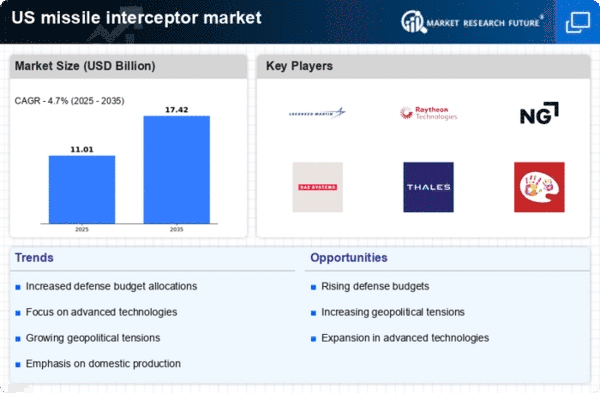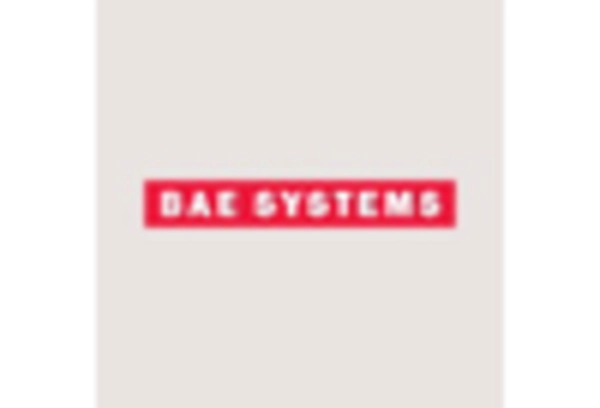Growing Geopolitical Tensions
The missile interceptor market is experiencing growth due to escalating geopolitical tensions, particularly in regions where military posturing is prevalent. Nations are increasingly investing in advanced missile defense systems to counter perceived threats. The U.S. government has allocated substantial funding, with defense budgets reaching approximately $750 billion in 2025, emphasizing the need for robust missile defense capabilities. This trend indicates a shift towards prioritizing national security, thereby driving demand for missile interceptors. As adversaries develop more sophisticated missile technologies, the U.S. military's focus on enhancing its interceptor systems becomes paramount. The missile interceptor market is thus positioned to benefit from these dynamics, as countries seek to bolster their defense mechanisms against potential missile attacks.
Increased Focus on Homeland Security
The missile interceptor market is benefiting from a heightened focus on homeland security, particularly in the context of emerging threats from rogue states and non-state actors. The U.S. government has recognized the necessity of protecting its territory from missile attacks, leading to increased investments in missile defense systems. In 2025, the budget for missile defense initiatives is projected to exceed $20 billion, reflecting a strategic shift towards enhancing domestic defense capabilities. This emphasis on homeland security is driving the missile interceptor market, as defense contractors develop systems tailored to address specific threats. As the landscape of global security evolves, the demand for effective missile interceptors is expected to rise, ensuring the protection of U.S. airspace.
International Defense Collaborations
The missile interceptor market is experiencing growth due to international defense collaborations aimed at enhancing missile defense capabilities. The U.S. has engaged in various partnerships with allied nations to develop and deploy advanced missile interceptor systems. These collaborations often involve joint research and development initiatives, sharing of technology, and co-production agreements. For example, the U.S. has partnered with countries like Japan and South Korea to bolster regional defense against missile threats from North Korea. Such alliances not only strengthen collective security but also expand the missile interceptor market by creating opportunities for defense contractors to participate in multinational projects. As these collaborations continue to evolve, the demand for missile interceptors is likely to increase, driven by shared security interests.
Emerging Threats from Ballistic Missiles
The missile interceptor market is significantly impacted by the emergence of new threats from ballistic missiles, particularly from nations with advancing missile capabilities. The U.S. military has identified the proliferation of ballistic missile technology as a critical concern, prompting increased investments in missile defense systems. In 2025, the missile defense budget is expected to allocate approximately $15 billion specifically for countering ballistic missile threats. This focus on addressing emerging threats is driving innovation within the missile interceptor market, as defense contractors develop more sophisticated interceptors capable of engaging a wider range of missile types. As adversaries continue to enhance their missile arsenals, the demand for effective missile interceptors is likely to grow, ensuring the U.S. remains prepared to counter these evolving challenges.
Technological Innovations in Defense Systems
The missile interceptor market is significantly influenced by ongoing technological innovations in defense systems. Advancements in radar, sensor technologies, and artificial intelligence are enhancing the effectiveness of missile interceptors. For instance, the integration of machine learning algorithms allows for improved target identification and tracking, which is crucial for intercepting fast-moving threats. The U.S. Department of Defense has invested over $10 billion in research and development for missile defense technologies in recent years, indicating a strong commitment to innovation. This focus on cutting-edge technology not only enhances the capabilities of existing systems but also paves the way for the development of next-generation interceptors. Consequently, the missile interceptor market is likely to see increased demand as nations strive to maintain technological superiority in defense.

















